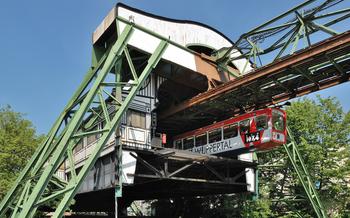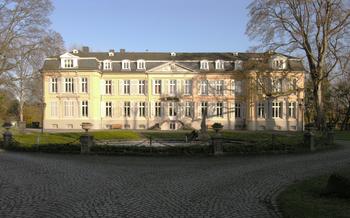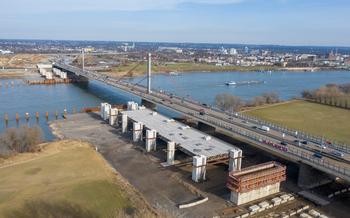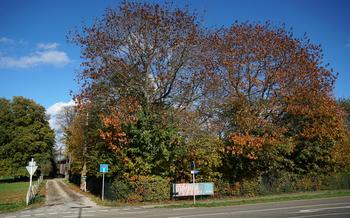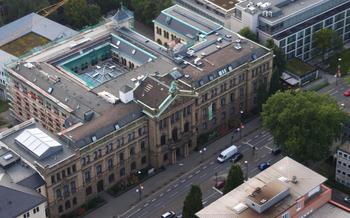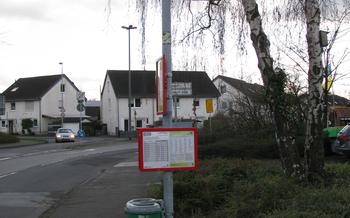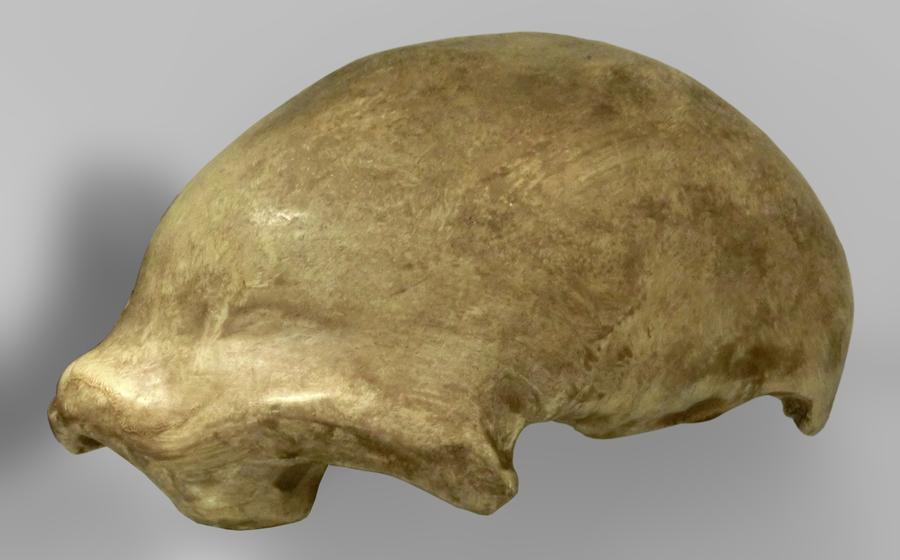
Neanderthal Museum
- Neanderthal Museum: A Journey Through Human Evolution
- Unraveling the Neanderthal Legacy
- Exploring the Museum's Highlights
- Engaging Activities for All Ages
- Stepping into the Neanderthal World
- Unveiling the Ice Age Landscape
- Interactive Learning Experiences
- Research and Conservation Efforts
- Temporary Exhibitions and Special Events
- Educational Resources and Publications
- Accessibility and Facilities
- Planning Your Visit
- Getting to the Neanderthal Museum
- Nearby Attractions and Points of Interest
- Insider Tip: Explore the Neanderthal Valley
Neanderthal Museum: A Journey Through Human Evolution
The Neanderthal Museum, situated in the city of Mettmann, Germany, holds a treasure trove of knowledge about our human ancestors. It was established in 1996 with the primary aim of showcasing the remarkable discoveries made at the Neanderthal Valley, a region renowned for its rich fossil record. The museum's location in the heart of this significant archaeological site adds to its allure.
The Neanderthal Museum stands as a unique institution dedicated entirely to the study and presentation of Neanderthal history and culture. It houses an impressive collection of artifacts, including the original Neanderthal skeleton discovered in the Neanderthal Valley in 185Interactive exhibits, multimedia displays, and hands-on experiences bring the fascinating world of Neanderthals to life, offering visitors an immersive journey through human evolution.
Unraveling the Neanderthal Legacy
The Neanderthals, a captivating branch of the human family tree, once roamed the Earth during the Pleistocene era. They were a robust and adaptable species, displaying unique physical characteristics that set them apart from modern humans, such as their stocky build, prominent brow ridges, and receding chins.
Their way of life, although shrouded in mystery, has been pieced together through archaeological discoveries. The Neanderthals were skilled hunters, utilizing sophisticated stone tools and techniques to bring down large prey. They lived in social groups, occupying caves and rock shelters, and displayed evidence of complex social behaviors, including caring for the sick and elderly.
The Neanderthals' cultural expressions were limited compared to modern humans, but they did exhibit a rudimentary form of art, creating symbolic engravings and jewelry. Their tools, crafted with precision and ingenuity, showcased their advanced technological capabilities.
A fascinating aspect of Neanderthal studies lies in their interaction with Homo sapiens. These two species coexisted for a period of time, and evidence suggests that they may have interbred, contributing to the genetic diversity of modern humans.
The ultimate demise of the Neanderthals remains a subject of ongoing research and debate. Various theories attempt to explain their extinction, including competition with Homo sapiens, climatic changes, and disease. The Neanderthal legacy, however, lives on in the genetic heritage of modern humans, reminding us of our shared ancestry and the interconnectedness of our evolutionary journey.
Exploring the Museum's Highlights
The Neanderthal Museum boasts an array of captivating exhibits that provide an immersive journey into the lives of our ancient ancestors. Among the must-see highlights is the museum's extensive collection of Neanderthal skeletons, offering a glimpse into their physical characteristics and evolutionary history. The centerpiece of the collection is the renowned Neanderthal 1 skeleton, discovered in 1856 in the Neander Valley and considered one of the most complete Neanderthal skeletons ever found.
Another highlight is the life-size replica of a Neanderthal family, providing a realistic portrayal of their social structure and family life. The museum also features interactive multimedia presentations that bring to life the world of the Neanderthals, showcasing their hunting techniques, toolmaking skills, and daily activities. These presentations offer a dynamic and engaging way to learn about Neanderthal culture and their interactions with the environment.
Engaging Activities for All Ages
The Neanderthal Museum offers a wide range of educational programs and workshops tailored to visitors of all ages. Themed guided tours provide an in-depth exploration of the museum's exhibits, led by knowledgeable guides who share fascinating insights into Neanderthal life and culture. Children and families are especially catered for, with interactive play areas, hands-on activities, and engaging workshops. The museum regularly hosts family-friendly events and workshops during school holidays and weekends, offering a fun and educational experience for the whole family.
Stepping into the Neanderthal World
The Neanderthal Museum offers a captivating journey into the world of our ancient ancestors through immersive exhibits and life-size dioramas. Visitors can step back in time as they explore realistic recreations of Neanderthal living spaces, hunting scenes, and social interactions. These lifelike displays provide a tangible connection to the lives and behaviors of our evolutionary kin. Interactive multimedia presentations and cutting-edge technology further enhance the experience, allowing visitors to engage with the Neanderthal world in new and exciting ways.
One of the highlights of the museum is the virtual reality experience, which transports visitors to the Ice Age landscape and offers a firsthand perspective of Neanderthal life. Through 3D reconstructions, visitors can explore the environment in which the Neanderthals lived, hunted, and interacted with their surroundings. Augmented reality applications add another layer of interactivity, allowing visitors to engage with virtual Neanderthals and learn about their tools, hunting techniques, and daily routines.
These immersive exhibits not only provide a glimpse into the past but also foster a deeper understanding of our evolutionary heritage and the interconnectedness of human history. Visitors leave the museum with a profound appreciation for the Neanderthals and their role in shaping our human ancestry.
Unveiling the Ice Age Landscape
The Neanderthal Museum also offers a glimpse into the world of the Neanderthals during the Ice Age. Interactive exhibits showcase the megafauna that roamed the earth during this period, such as woolly mammoths, saber-toothed tigers, and giant sloths. Visitors can learn about the Ice Age climate and geology through hands-on displays and multimedia presentations. Dioramas depict ancient landscapes, transporting visitors back in time to experience the environment in which the Neanderthals lived. Fossil discoveries from the Neanderthal Valley and other sites shed light on the lives of these early humans and their interaction with the Ice Age world.
Interactive Learning Experiences
The Neanderthal Museum offers interactive learning experiences to enhance the understanding of the Neanderthal era and the Ice Age. Visitors can delve into hands-on activities that provide a deeper, immersive engagement with the subject matter.
Excavation Simulations: Visitors can participate in simulated archaeological excavations, uncovering virtual fossils and artifacts that reveal their significance in Neanderthal life. These interactive exercises allow participants to experience the thrill of discovery and gain a hands-on perspective of the archaeological process.
Fossil Casting Workshops: The museum conducts fossil casting workshops, where visitors can create replicas of ancient fossils using plaster or resin. This hands-on activity not only teaches about the preservation of fossils but also allows participants to bring home a tangible artifact as a souvenir of their visit.
Multimedia Stations: Multimedia stations throughout the museum provide interactive, educational content and engaging visuals. Visitors can explore digital displays, touchscreens, and interactive maps to learn about Neanderthal culture, tools, and daily life. These multimedia stations enhance the museum's storytelling, making learning both interactive and captivating.
Research and Conservation Efforts
The Neanderthal Museum is not just a showcase for the past; it is also a hub for ongoing research and conservation efforts. The museum collaborates with institutions worldwide to advance the study of Neanderthals and their era. Researchers utilize the museum's extensive collection and facilities to conduct groundbreaking studies on Neanderthal genetics, behavior, and cultural practices.
The museum also plays a vital role in conserving Neanderthal sites and artifacts. Through partnerships with local authorities and organizations, the museum works to protect and preserve Neanderthal heritage for future generations. Ongoing archaeological excavations at various sites in the region contribute to our understanding of Neanderthal lifeways and their interactions with the changing environment. These collaborative efforts ensure that the legacy of the Neanderthals continues to be preserved and shared with the world.
Temporary Exhibitions and Special Events
The Neanderthal Museum keeps its exhibits fresh and engaging by hosting a variety of temporary exhibitions that delve into various aspects of human evolution, Neanderthal culture, and the Ice Age. These exhibitions showcase new discoveries, cutting-edge research, and unique artifacts from around the world.
The museum also organizes thematic events, workshops, and lectures to enhance the visitor experience. These events offer an opportunity to interact with experts, participate in discussions, and gain deeper insights into Neanderthal life, culture, and the Ice Age environment.
Seasonal programs and activities add another dimension to the museum's offerings. During the summer months, visitors can enjoy outdoor events, guided tours, and hands-on activities that bring the Ice Age to life. Winter brings its own charm with festive events, workshops, and exhibitions that explore the unique aspects of the Neanderthal experience during the cold season.
Special exhibitions showcasing new discoveries are a highlight of the museum's calendar. These exhibitions often feature groundbreaking research, rare artifacts, and immersive displays that provide visitors with a glimpse into the latest developments in Neanderthal studies.
Whether you're interested in the latest scientific findings, engaging in interactive workshops, or simply experiencing the wonder of the Ice Age, the Neanderthal Museum's temporary exhibitions and special events offer something for everyone.
Educational Resources and Publications
The Neanderthal Museum offers a wealth of educational materials and publications to enhance visitors' understanding of Neanderthals and the Ice Age. These resources include:
-
Publications and Guides: The museum publishes a range of books, guides, and catalogs that delve into the research and discoveries related to Neanderthals and the Ice Age. These publications provide in-depth knowledge and insights for enthusiasts and researchers alike.
-
Educational Materials: Teachers and educators can access a variety of educational materials, such as lesson plans, worksheets, and activity guides, to incorporate Neanderthal-themed lessons into their classrooms. These materials help bring the history and science of Neanderthals to life for students of all ages.
-
Online Resources: The museum's website offers a treasure trove of online resources, including videos, podcasts, and interactive content. These resources provide further insights into Neanderthal research, Ice Age climate and geology, and the museum's ongoing conservation efforts.
-
Access to Scientific Databases: Researchers and scholars have access to the museum's extensive scientific databases, which house a vast collection of data and research findings on Neanderthals and the Ice Age. This resource is invaluable for academic research and contributes to the advancement of our understanding of human evolution.
Accessibility and Facilities
The Neanderthal Museum is committed to providing an inclusive and accessible experience for all visitors. Wheelchair ramps and elevators ensure that the entire museum is accessible to those with disabilities. Audio guides in multiple languages, including English, German, French, Spanish, Russian, and Chinese, are available to enhance the visitor experience.
For the convenience of visitors, a cafeteria and dining options are located within the museum, offering a variety of refreshments and meals to cater to different preferences. The museum shop is a treasure trove of souvenirs, educational materials, and books related to Neanderthals, human evolution, and the Ice Age. Visitors can browse through a wide selection of items to take home as a memento of their visit.
Planning Your Visit
To make the most of your visit to the Neanderthal Museum, it's essential to plan ahead. Here are some helpful tips:
-
Duration: Allocate at least two to three hours for exploring the museum's exhibits and displays. This will allow you to immerse yourself in the Neanderthal world and engage with the interactive experiences.
-
Advance Booking: Consider booking your tickets online in advance, especially during peak tourist seasons. This will ensure a smooth and hassle-free entry into the museum.
-
Group Discounts: If you're visiting with a group, inquire about group discounts and special offers. The museum often offers reduced rates for educational groups, families, and senior citizens.
-
Seasonal Programs: Check the museum's website for seasonal programs and activities. These may include themed exhibitions, workshops, lectures, and special events that offer unique insights into Neanderthal history and culture.
Getting to the Neanderthal Museum
The Neanderthal Museum is conveniently located in the heart of the Neander Valley, making it easily accessible from Düsseldorf and the surrounding region. To reach the museum, visitors can opt for public transportation or travel by car.
Public Transportation:
- Take the S-Bahn line S11 from Düsseldorf Hauptbahnhof (main train station) to Neanderthal station. The journey takes approximately 20 minutes.
- From Neanderthal station, follow the signs or use the pedestrian underpass to reach the museum, which is a short walk away.
Driving:
- From Düsseldorf, take the A46 motorway towards Wuppertal.
- Take exit 29 (Neanderthal) and follow the signs to the museum.
- Ample parking spaces are available at the museum's car park.
Nearby Attractions and Points of Interest:
- After visiting the Neanderthal Museum, consider exploring the picturesque Neander Valley, renowned for its natural beauty and historical significance.
- Take a leisurely walk along the Neanderthal Steig trail, which offers stunning views of the valley and the surrounding landscape.
- Visit the Neanderthal Gorge, where the Neanderthal fossils were discovered, and learn more about the fascinating history of human evolution.
Nearby Attractions and Points of Interest
The Neanderthal Museum is situated in the heart of the Neanderthal Valley, a region steeped in history and natural beauty. Embark on a journey through time as you explore the surrounding area, uncovering the secrets of our ancestors and immersing yourself in the breathtaking landscapes that shaped their lives.
Discover historical landmarks that tell the story of the region's rich past, from ancient castles and fortresses to charming medieval towns. Indulge in the local cuisine, savoring traditional dishes that have been passed down through generations. Hike along scenic nature trails, marveling at the panoramic views and encountering wildlife in their natural habitat.
Delve into the world of paleolithic cave art, uncovering the hidden meanings behind the intricate paintings and carvings that adorn the valley's caves. Visit archaeological sites where remnants of Neanderthal settlements have been unearthed, providing a glimpse into their daily lives and customs.
The Neanderthal Valley offers a unique blend of history, culture, and natural wonders, inviting you to step into the footsteps of our ancestors and experience the region's captivating charm.
Insider Tip: Explore the Neanderthal Valley
Immerse yourself in the captivating history of the Neanderthals by stepping out of the museum and into the Neanderthal Valley, a UNESCO World Heritage Site.
-
Embark on guided tours that take you through the scenic valley, showcasing significant archaeological sites and providing insights into their way of life.
-
Follow the hiking trails, which lead you past stunning viewpoints, revealing breathtaking panoramas of the region.
-
Marvel at the ancient cave art found in the valley, offering a glimpse into the artistic expression of our ancestors.
-
Discover the Ice Age landscape on foot, exploring the very terrain that shaped the lives of the Neanderthals and immersing yourself in their world.
